|
|
|
Sort Order |
|
|
|
Items / Page
|
|
|
|
|
|
|
| Srl | Item |
| 1 |
ID:
140836
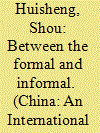

|
|
|
|
|
| Summary/Abstract |
Official efforts to improve rural governance in China have been confronted with resistance not only from local leaders but, interestingly, from rural residents as well. Two problems have jointly prevented these efforts from being effective: agency problems associated with formal institutions that split the interests of village leaders against their community, and collective action problems facing rural residents who are unable to defend their interests through horizontal societal networks. These two problems, working in tandem, allow village leaders to, ironically, enhance their control without being subject to state supervision and popular pressure. Some recent progresses have helped bridge the formal and informal institutions for greater accountability of rural leaders, although persistent challenges suggest an uncertain future for rural governance.
|
|
|
|
|
|
|
|
|
|
|
|
|
|
|
|
| 2 |
ID:
101272
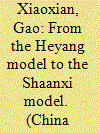

|
|
|
|
|
| Publication |
2010.
|
| Summary/Abstract |
In the fifth village elections in 2003 in Shaanxi province only 184 women were elected as village heads, a mere 0.6 per cent of the total. By the sixth elections in 2006 the number had almost doubled, and by the seventh elections in 2009 it had increased to 544. Together with the women on village Party committees, there were now 1,193 women village officials throughout the province, 4.5 per cent of the total. In contrast to leading women cadres within the formal structures of the political system, these village heads owed their positions not to nomination by upper levels of Party and government leadership but to success in fiercely competitive elections. Their success was the result of a grass-roots movement launched by a civil organization, the Shaanxi Research Association for Women and Family, to mobilize women's political participation. Their activities and trajectories had an impact on the local gender division of labour and entrenched gender attitudes that far surpassed the numbers alone. This article examines the collaboration between the Shaanxi Research Association for Women and Family and the All-China Women's Federation to mobilize women's political participation in Heyang county, Shaanxi province. It particularly focuses on the role of the Research Association in drawing on international feminist practices of women's empowerment to provide participatory based gender training courses as the key to persuading women to confront local and institutional resistance. Collaboration between the Research Association and the Women's Federation opened up access to significant resources both within and outside the system, creating new spaces for the articulation and protection of women's rights. Originating in a grass-roots movement, this collaboration can be seen as an instance of China's contemporary movement for gender equality.
|
|
|
|
|
|
|
|
|
|
|
|
|
|
|
|
| 3 |
ID:
141096
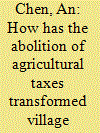

|
|
|
|
|
| Summary/Abstract |
The abolition of agricultural taxes (AAT) (2005–2006) significantly changed the workload, finance, authority and functions of village governments. In agricultural regions, village cadres had their agendas reset, with the top priority switching to the search for new revenues through “attracting investment” (zhaoshang yinzi). This new agenda fits perfectly with the demands of township governments. Facing an even worse fiscal crisis, township governments attempted to cover up their deficits using village revenues. The shared stake in increasing revenue has resulted in the convergence of the functions of township and village authorities. However, the change in the function of village governments has increased the disengagement between cadres and villagers.
|
|
|
|
|
|
|
|
|
|
|
|
|
|
|
|
| 4 |
ID:
126652
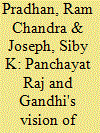

|
|
|
| 5 |
ID:
181880
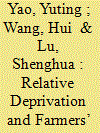

|
|
|
|
|
| Summary/Abstract |
Land expropriation is a common source of grievances and resistance from farmers in China. Based on survey data, we propose that farmers’ sense of relative deprivation is one of the causes. Our study focuses on compensation distribution in villages, where village collectives are the reference for comparison. Relative deprivation is measured by the ratio of farmer compensation to the standard government compensation; the gap between these is roughly the compensation retained by village collectives. The outcome variable is farmers’ willingness to participate in village governance. The empirical test is based on 2017 data from the Chinese Family Database of Zhejiang University and compensation standards data collected by the authors. Nearly 75% of respondents received less than standard compensation, which indicates widespread relative deprivation. And the greater the relative deprivation of farmers, the more willing they are to participate in village governance.
|
|
|
|
|
|
|
|
|
|
|
|
|
|
|
|
|
|
|
|
|